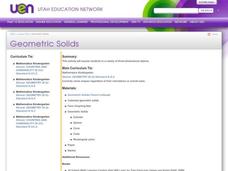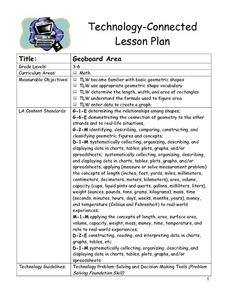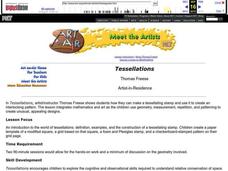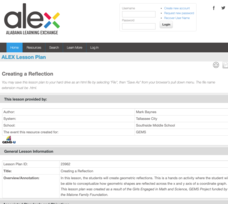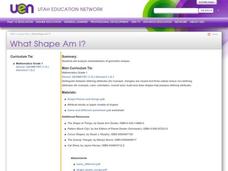State of Michigan
Pre-K Mathematics
Kick-start children's education with this pre-school math unit. Offering 31 different hands-on learning activities that develop young mathematicians' pattern and shape recognition, basic number sense, and much more, this is a must-have...
Curated OER
Count on Me
Fourth graders use inductive reasoning to find algebraic patterns in geometric figures. They use technology (i.e., calculators, computers) and manipulatives to discover number patterns involving geometric concepts. They solve concrete...
Curated OER
Representing and Extending Patterns
Learners explore repeating and growing patterns. In this patterns lesson, students describe patterns, explore changing patterns and match patterns. Learners participate in online activities and read books that show patterns in nature and...
Curated OER
Geometric Solids
Students identify and create simple geometric shapes and describe simple spatial relationships. Through discussion, hands-on activities and show and tell, they identify geometric solids in real life and create graphs of commonly found...
Curated OER
Finding The Sum of an Infinite Series
Students examine finding the sum of an infinite series as the limit of partial sums. Through hands-on activities, students create their own sequence by finding the area of a square and then cutting it in half-sized pieces. They write...
Curated OER
Patterns in the Sums of Polygon Angles
Sixth graders discover the patterns of sums of polygon angles. In this math lesson plan, 6th graders study the properties of geometric shapes to solve problems as they participate in hands-on activities.
Curated OER
Shape Patterns
In this math worksheet, students examine a pattern of geometric shapes. After looking at the sequence of shapes and deciding what the pattern is, students choose the shape that would come next. There are 4 problems.
Curated OER
Measuring Pattern Block Angles
Sixth graders identify various angles by using pattern blocks. For this measurement lesson, 6th graders find out how many degrees are in each of the different angles of the various pattern blocks.
Curated OER
Geoboard Squares
Students create squares of different sizes on a geoboard. They find and describe a pattern. Students use the pattern to determine the number of squares possible on a 10-by-10 geoboard. They create squares with a horizontal base (and...
Curated OER
Falling Into Geometry Through Paper Art
Students explore geometric shapes. In this kindergarten geometry lesson, students create a fall quilt consisting of three different paper geometric quilt squares that when assembled form a scarecrow, a pumpkin, and a crow.
Curated OER
Rep Tiles
Third graders use pattern blocks of one shape at a time to try to create a similar shape. They compare the perimeter of the new figure with the perimeter of the original shape and look for a pattern. Students use the pattern to predict...
Curated OER
Geo-Wrap Vests
First graders use geometric shapes to create and extend patterns. Students read a book and view African garments. They identify patterns in the garments. Students create and decorate a paper vest with geometric patterns.
Curated OER
Geoboard Area
Students explore the basic geometric shapes and geometric shape vocabulary through the use of geoboards and virtual geoboards. They create a variety of shapes with a partner, build ten different rectangles on their geoboards, and...
Curated OER
Tessellations
Students learn and review basic geometric terms, definitions, and theory, including regular polygons, lines, angles, points, etc. They make a tessellating stamp and create a repeating work of art.
Curated OER
An Introduction to Sequences
Fourth graders are introduced to arithmetic and geometric sequences. In this mathematics lesson, 4th graders produce a variety of sequences by varying the starting number, multiplier, and the add-on number.
Alabama Learning Exchange
Creating a Reflection
Investigate geometric reflections in this geometry lesson plan. Create geometric reflections that show the reflection across the x and y axis of a coordinate graph. Learners watch a teacher demonstration before proceeding on their own....
Curated OER
What Shape Am I?
First graders analyze characteristics of geometric shapes. They identify, describe, and create simple geometric figures. They analyze characteristics of geometric shapes and determine the defining attributes of a circle,...
Curated OER
Beauty: Patterns in Nature
Students explore the patterns of nature. In this interdisciplinary instructional activity, students examine beauty in nature and participate in a hands-on simulation that demonstrates how human preferences for beauty have led to an...
Curated OER
Why is this lesson constructivist?
Students formulate a definition of tessellations by comparing and contrasting different patterns and shapes of real objects. They discuss the relatioship between shapes and patterns as well as their function in the real world. Students...
Curated OER
Honors Algebra 2 Reivew: Practice with Sequences
In this practice with sequences worksheet, students find the arithmetic sequence and geometric sequence of given problems. They determine the percent of change and solve exponent problems. This one-page worksheet contains 11 problems.
Curated OER
Rhythm and Art: Rhythm Collage
Students create a collage in response to musical rhythm. In this visual arts lesson plan, students will better understand the connection between visual arts and musical rhythm. Students will follow the teacher's model of letting the...
Pennsylvania Department of Education
Volume of Regular and Irregular Objects
Fifth graders examine patterns and relate to equations to solve math problems. In this patterns lesson, 5th graders diagram, graph, use models and use tables to solve equations for real world problems.
Pennsylvania Department of Education
Volume of Compound Figures
Fifth graders use patterns, models and relationships to solve equations. In this equations lesson, 5th graders define vocabulary for equations and complete worksheets explaining variables and solving problems.
Curated OER
Patterns
Second graders create an ABAB pattern with their name. In this early elementary math lesson plan, 2nd graders first model their names in an ABAB pattern with unifix cubes. They then recreate the pattern using letter stamps on KidPix.





